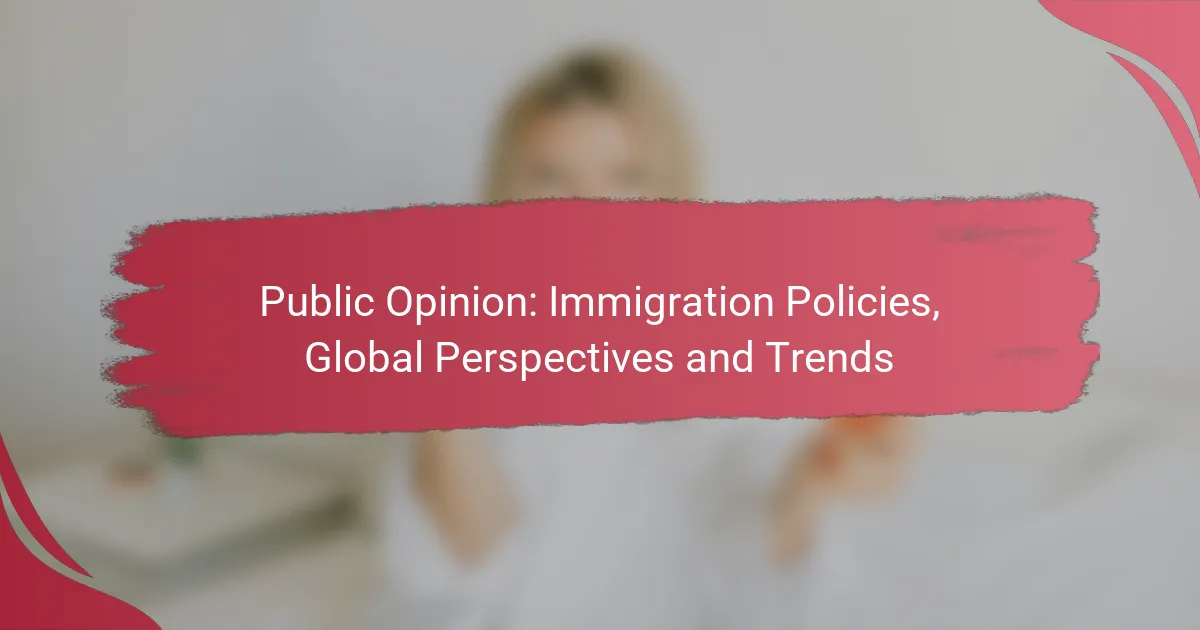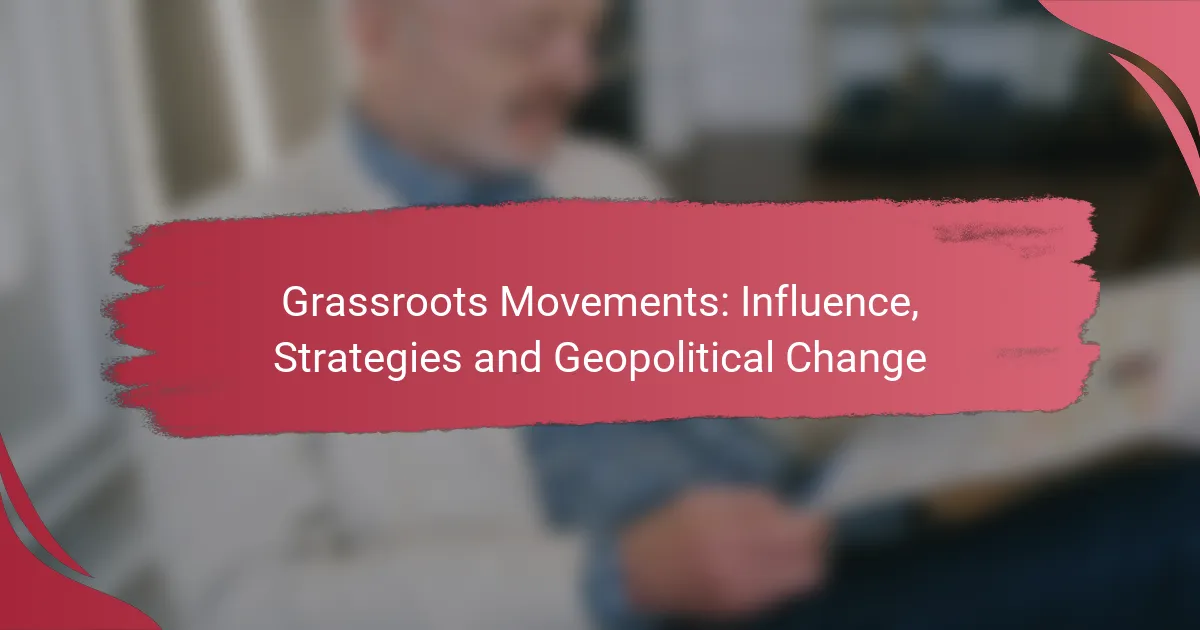Public opinion on immigration policies is a dynamic reflection of societal values and political climates across the globe. In the United States, these policies are influenced by a mix of laws and public sentiment, affecting diverse groups such as refugees and skilled workers. Similarly, in Europe, immigration strategies shape perceptions of national identity and security, while global trends reveal a complex balance between restrictive and inclusive approaches to immigration.
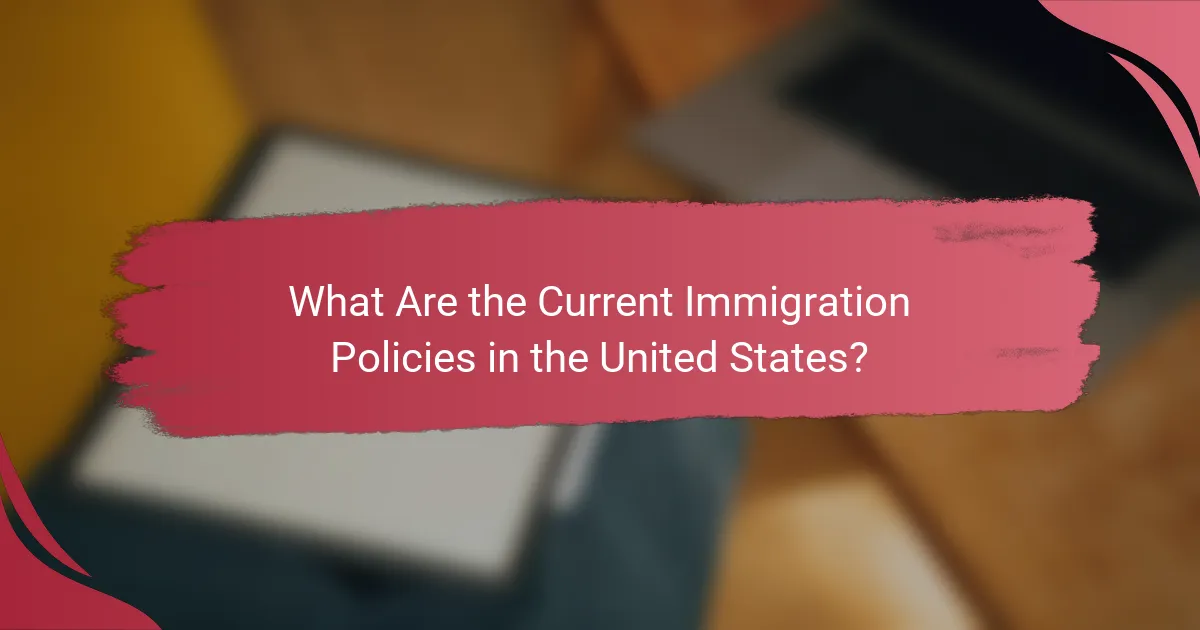
What Are the Current Immigration Policies in the United States?
The current immigration policies in the United States are shaped by a combination of laws, regulations, and executive actions that govern the entry, stay, and status of non-citizens. These policies are often subject to change based on political leadership and public sentiment, impacting various groups including refugees, skilled workers, and undocumented immigrants.
Overview of US Immigration Policies
US immigration policies primarily focus on family reunification, employment-based immigration, and humanitarian protection. The system allows for various visa categories, including family visas, work visas, and student visas, each with specific eligibility criteria and application processes. Additionally, policies like Deferred Action for Childhood Arrivals (DACA) provide temporary relief from deportation for certain undocumented individuals.
Understanding the complexities of these policies is crucial for potential immigrants. For instance, family-sponsored visas can take years to process, while employment-based visas often require employer sponsorship and adherence to labor market tests.
Key Legislative Changes
Recent legislative changes have significantly influenced US immigration policies. The introduction of the Immigration and Nationality Act amendments has altered visa quotas and eligibility requirements, while executive orders have impacted enforcement priorities and pathways to citizenship. For example, the Biden administration has sought to reverse several policies from the previous administration, aiming to create a more inclusive immigration system.
Staying informed about these changes is essential for individuals seeking to navigate the immigration process. Regularly checking official government resources, such as the USCIS website, can provide updates on policy shifts and application procedures.
Impact on Public Opinion
Public opinion on immigration policies in the United States is deeply divided and influenced by various factors, including economic conditions, security concerns, and cultural attitudes. Polls often show that a significant portion of the population supports pathways to citizenship for undocumented immigrants, while others advocate for stricter border controls and enforcement measures.
This division in public sentiment can affect political discourse and policy-making. Advocacy groups play a crucial role in shaping opinions by highlighting personal stories and economic contributions of immigrants, which can lead to shifts in public perception over time.
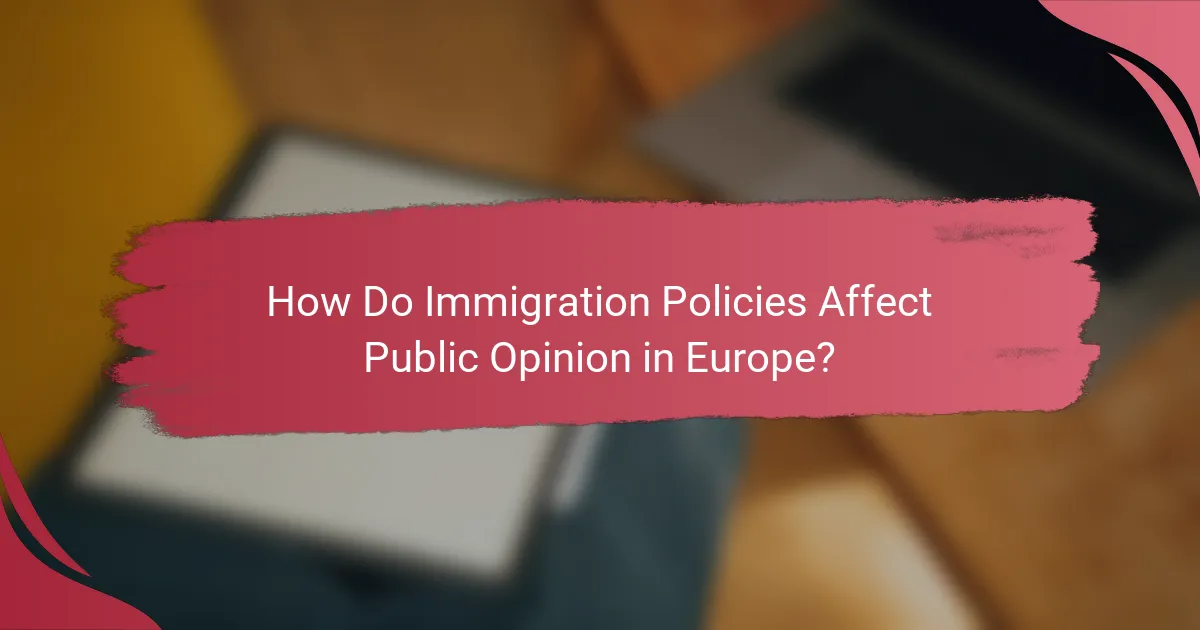
How Do Immigration Policies Affect Public Opinion in Europe?
Immigration policies significantly shape public opinion in Europe by influencing perceptions of national identity, security, and economic stability. As countries implement various immigration strategies, public sentiment often reflects the perceived effectiveness and humanitarian aspects of these policies.
Public Sentiment Trends
Public sentiment regarding immigration in Europe has fluctuated over the years, often influenced by economic conditions and political rhetoric. In recent years, there has been a notable rise in skepticism towards immigration, particularly in response to economic downturns and security concerns. Surveys indicate that many citizens express a preference for stricter immigration controls, reflecting fears about job competition and cultural integration.
Additionally, the rise of populist political movements has further polarized opinions on immigration. These movements often capitalize on public fears, leading to increased support for policies that prioritize national interests over humanitarian considerations.
Case Studies: Germany and France
Germany’s approach to immigration has evolved significantly, especially following the 2015 refugee crisis. Initially, the open-door policy garnered widespread support, but as challenges emerged, including integration issues and public safety concerns, opinions shifted. Recent polls show a growing segment of the population advocating for more stringent immigration regulations.
In France, immigration remains a contentious topic, with public opinion often swayed by political campaigns. The government has implemented reforms aimed at tightening immigration controls, which resonate with a substantial portion of the electorate. This trend reflects a broader European pattern where immigration policies are increasingly viewed through the lens of national security and economic impact.
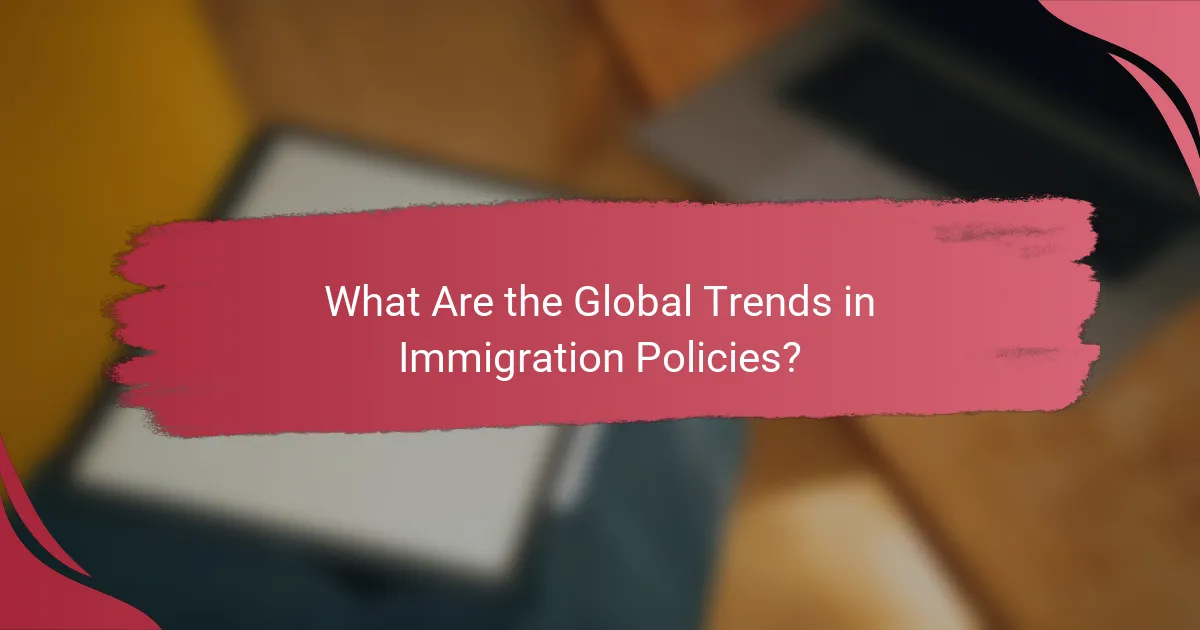
What Are the Global Trends in Immigration Policies?
Global trends in immigration policies reflect a complex interplay of economic needs, political climates, and social attitudes. Many countries are shifting towards more restrictive measures while others are adopting more inclusive approaches to attract talent and address labor shortages.
Comparative Analysis of Global Policies
Immigration policies vary significantly across regions, influenced by local economic conditions and political ideologies. For instance, countries like Canada and Australia have points-based systems that favor skilled immigrants, while the United States has a mix of family-based and employment-based immigration pathways. In contrast, many European nations are tightening borders, focusing on security and integration challenges.
Additionally, some countries, such as Germany, have implemented temporary protection measures for refugees, while others maintain strict asylum processes. Understanding these differences is crucial for individuals and businesses navigating international migration.
Emerging Trends in Immigration
Recent trends indicate a growing emphasis on technology in immigration processes, such as digital applications and biometric verification. These advancements aim to streamline procedures and enhance security, making it easier for legitimate travelers while deterring illegal immigration.
Another notable trend is the increasing focus on climate change as a factor in migration. Countries are beginning to recognize the need for policies addressing climate refugees, who are displaced due to environmental factors. This shift may lead to new categories of visas and protections in the coming years.
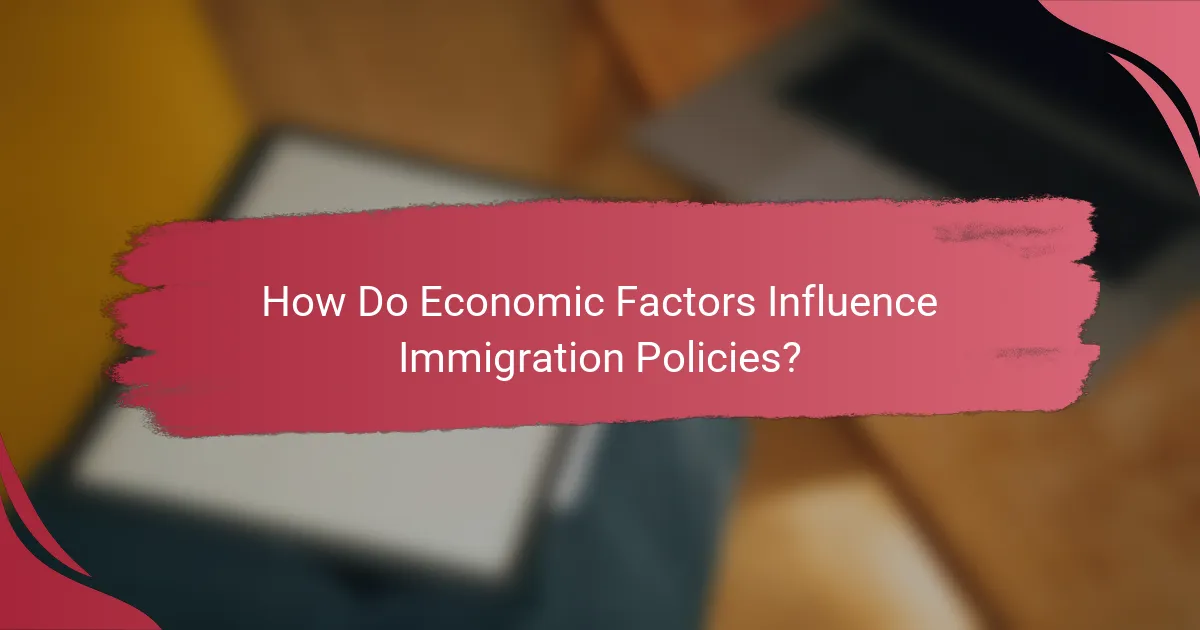
How Do Economic Factors Influence Immigration Policies?
Economic factors play a crucial role in shaping immigration policies, as countries often adjust their regulations based on labor demands, economic growth, and the need for skilled workers. These policies can either encourage or restrict immigration depending on the prevailing economic conditions and labor market requirements.
Economic Drivers of Immigration
Economic drivers of immigration include job availability, wage levels, and overall economic stability. Countries with strong economies and high demand for labor tend to attract more immigrants seeking better opportunities. For instance, nations like the United States and Germany have historically seen increases in immigration during periods of economic expansion.
Additionally, factors such as political stability and quality of life also influence immigration patterns. Countries that offer robust social services and a high standard of living are more likely to attract immigrants, as individuals seek not only jobs but also a better quality of life for themselves and their families.
Impact of Labor Markets
The labor market significantly affects immigration policies, as governments often tailor their immigration regulations to fill gaps in the workforce. For example, sectors experiencing labor shortages may see relaxed immigration rules to allow for the entry of foreign workers. This is common in industries like healthcare, agriculture, and technology.
Conversely, during economic downturns, countries may tighten immigration policies to protect local jobs. This can lead to stricter visa requirements and reduced quotas for foreign workers. Understanding the current labor market conditions is essential for both policymakers and potential immigrants to navigate these changes effectively.

What Role Does Media Play in Shaping Public Opinion on Immigration?
Media plays a crucial role in shaping public opinion on immigration by influencing perceptions and framing narratives. Through coverage, commentary, and social media engagement, the media can sway public attitudes and policy discussions significantly.
Media Coverage Trends
Media coverage trends often reflect the prevailing political climate and societal attitudes toward immigration. In recent years, there has been a noticeable increase in reporting on immigration issues, particularly during election cycles or crises, which can amplify public concern or support.
For example, during times of heightened immigration activity, news outlets may focus on border security and enforcement, while in more stable periods, they might highlight immigrant contributions to society. This selective emphasis can shape how the public perceives immigration and its implications.
Influence of Social Media
Social media platforms have transformed how immigration narratives are shared and consumed, allowing for rapid dissemination of information and opinions. Users often engage with content that resonates with their beliefs, which can create echo chambers that reinforce existing views on immigration.
Moreover, social media can amplify grassroots movements and campaigns, making it easier for marginalized voices to be heard. However, misinformation can spread quickly, complicating public understanding of immigration issues. Users should critically evaluate sources and seek diverse perspectives to form a well-rounded opinion.
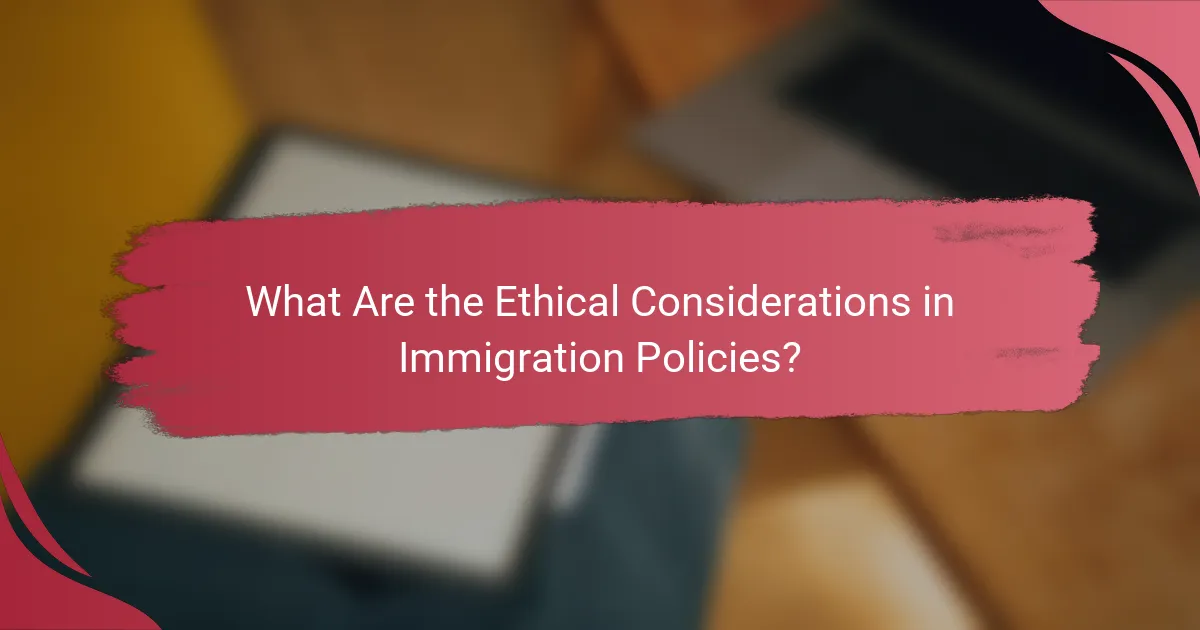
What Are the Ethical Considerations in Immigration Policies?
Ethical considerations in immigration policies revolve around balancing national interests with human rights and humanitarian obligations. Policymakers must navigate complex moral dilemmas, ensuring that laws protect vulnerable populations while addressing public concerns about security and resource allocation.
Human Rights Perspectives
From a human rights standpoint, immigration policies should uphold the dignity and rights of all individuals, regardless of their status. This includes ensuring access to basic needs such as healthcare, education, and legal protection. Countries that prioritize human rights often implement frameworks that safeguard against discrimination and promote integration.
For example, the Universal Declaration of Human Rights emphasizes the right to seek asylum from persecution. Nations that adhere to this principle typically have more inclusive immigration policies, which can foster social cohesion and respect for diversity.
Debates on Refugee Status
The debate surrounding refugee status often centers on the criteria for granting asylum and the responsibilities of host countries. Many argue that refugees should be protected under international law, which obligates nations to provide safe haven for those fleeing violence and persecution. However, differing interpretations of what constitutes a refugee can lead to inconsistencies in policy application.
Some countries may impose stricter regulations, requiring extensive documentation or proof of danger, which can delay or deny asylum claims. This raises ethical questions about the treatment of vulnerable individuals and the moral obligations of nations to assist those in dire circumstances.
